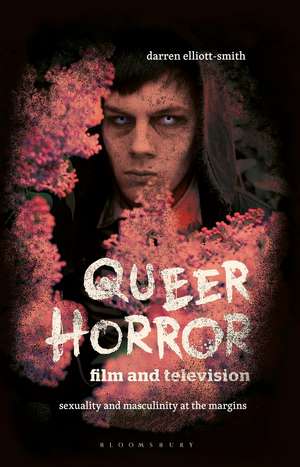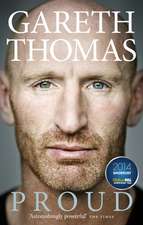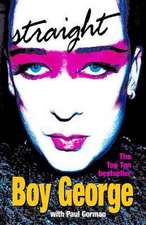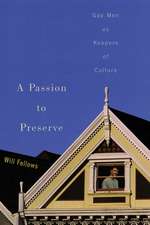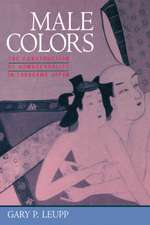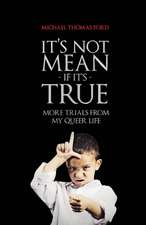Queer Horror Film and Television: Sexuality and Masculinity at the Margins: Library of Gender and Popular Culture
Autor Darren Elliott-Smithen Limba Engleză Paperback – 27 iul 2022
| Toate formatele și edițiile | Preț | Express |
|---|---|---|
| Paperback (1) | 197.24 lei 6-8 săpt. | |
| Bloomsbury Publishing – 27 iul 2022 | 197.24 lei 6-8 săpt. | |
| Hardback (1) | 772.58 lei 3-5 săpt. | |
| Bloomsbury Publishing – 29 sep 2016 | 772.58 lei 3-5 săpt. |
Din seria Library of Gender and Popular Culture
- 22%
 Preț: 230.61 lei
Preț: 230.61 lei - 30%
 Preț: 567.99 lei
Preț: 567.99 lei - 23%
 Preț: 191.31 lei
Preț: 191.31 lei - 30%
 Preț: 656.47 lei
Preț: 656.47 lei - 23%
 Preț: 196.96 lei
Preț: 196.96 lei - 30%
 Preț: 540.09 lei
Preț: 540.09 lei - 20%
 Preț: 219.27 lei
Preț: 219.27 lei - 23%
 Preț: 174.07 lei
Preț: 174.07 lei - 23%
 Preț: 191.04 lei
Preț: 191.04 lei - 22%
 Preț: 231.34 lei
Preț: 231.34 lei - 30%
 Preț: 509.52 lei
Preț: 509.52 lei - 30%
 Preț: 540.65 lei
Preț: 540.65 lei - 30%
 Preț: 509.52 lei
Preț: 509.52 lei - 13%
 Preț: 174.25 lei
Preț: 174.25 lei - 28%
 Preț: 496.43 lei
Preț: 496.43 lei - 23%
 Preț: 191.22 lei
Preț: 191.22 lei - 23%
 Preț: 223.28 lei
Preț: 223.28 lei - 30%
 Preț: 598.91 lei
Preț: 598.91 lei - 30%
 Preț: 510.03 lei
Preț: 510.03 lei - 24%
 Preț: 189.61 lei
Preț: 189.61 lei - 23%
 Preț: 191.56 lei
Preț: 191.56 lei - 24%
 Preț: 196.08 lei
Preț: 196.08 lei - 23%
 Preț: 146.78 lei
Preț: 146.78 lei - 21%
 Preț: 216.99 lei
Preț: 216.99 lei - 23%
 Preț: 197.24 lei
Preț: 197.24 lei - 24%
 Preț: 196.44 lei
Preț: 196.44 lei - 30%
 Preț: 538.61 lei
Preț: 538.61 lei - 23%
 Preț: 196.96 lei
Preț: 196.96 lei - 30%
 Preț: 597.87 lei
Preț: 597.87 lei - 23%
 Preț: 197.05 lei
Preț: 197.05 lei - 14%
 Preț: 176.44 lei
Preț: 176.44 lei - 23%
 Preț: 222.46 lei
Preț: 222.46 lei
Preț: 197.24 lei
Preț vechi: 257.59 lei
-23% Nou
Puncte Express: 296
Preț estimativ în valută:
37.74€ • 39.41$ • 31.24£
37.74€ • 39.41$ • 31.24£
Carte tipărită la comandă
Livrare economică 04-18 aprilie
Preluare comenzi: 021 569.72.76
Specificații
ISBN-13: 9781350259089
ISBN-10: 135025908X
Pagini: 272
Ilustrații: 22 bw illus
Dimensiuni: 138 x 216 mm
Greutate: 0.31 kg
Editura: Bloomsbury Publishing
Colecția Bloomsbury Academic
Seria Library of Gender and Popular Culture
Locul publicării:London, United Kingdom
ISBN-10: 135025908X
Pagini: 272
Ilustrații: 22 bw illus
Dimensiuni: 138 x 216 mm
Greutate: 0.31 kg
Editura: Bloomsbury Publishing
Colecția Bloomsbury Academic
Seria Library of Gender and Popular Culture
Locul publicării:London, United Kingdom
Caracteristici
Highlights the work of male directors/producers who self-identify as gay, bi, queer, or transgender and whose work features homoerotic, or explicitly homosexual, narratives with "out" gay characters
Notă biografică
Here, Darren Elliot-Smith examines how alternative sexualities have recently emerged from the shadows in horror films and television programmes, with directors and producers employing an overtly queer horror aesthetic that unequivocally references homosexuality. Elliot-Smith case studies consider many forms of the queer horror genre: independent exploitation films ( A Far Cry from Home ), slashers ( Hellbent ) and even the representation of contemporary gay zombies in LA Zombie . Elliott-Smith deviates from analyzing the monster as a symbol of heterosexual fear and focuses instead on queer anxieties within gay male subcultures. Furthermore, he examines key works to reveal gay men's concerns about their assimilation into Western culture, their continuing association with the feminine, and the perpetuation of gay shame.
